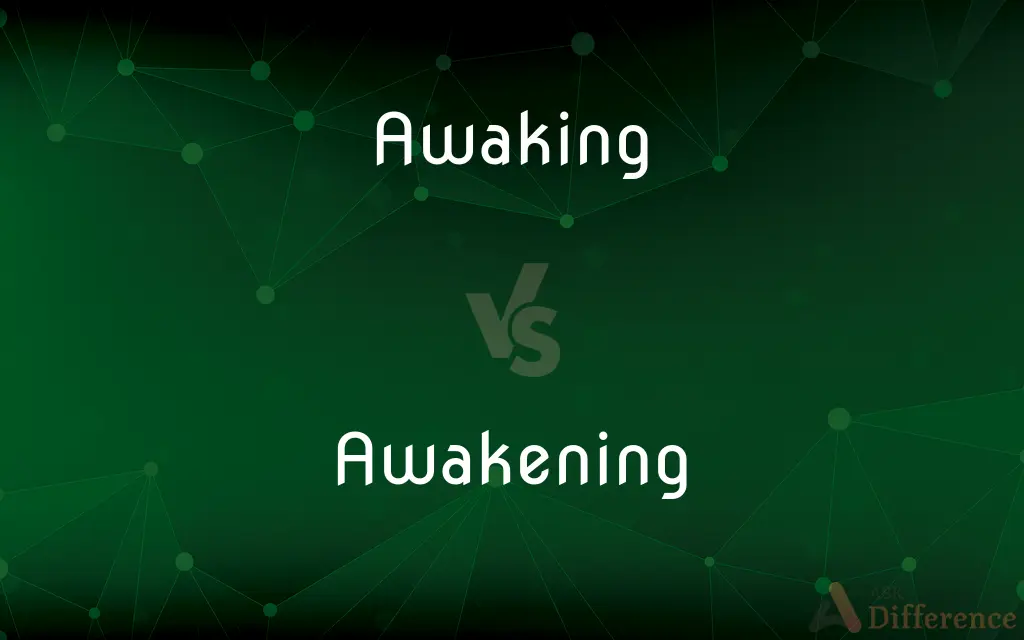Awaking vs. Awakening — What's the Difference?
By Tayyaba Rehman — Published on October 11, 2023
"Awaking" and "Awakening" both refer to the act of waking up or becoming aware, but "Awaking" is often used as a verb, and "Awakening" as a noun or adjective, describing a revival or realization.

Difference Between Awaking and Awakening
Table of Contents
ADVERTISEMENT
Key Differences
Awaking" and "Awakening" are intertwined in meaning, primarily referring to the process of becoming awake or conscious, whether it be literally from sleep or metaphorically from ignorance. "Awaking," typically utilized as a verb, describes the action or state of waking up or becoming alert, conscious, or aware. It relates to the transient action or process of moving from a state of sleep or unawareness to a state of wakefulness or awareness.
"Awakening," alternatively, is generally used as a noun or an adjective, depicting a state or period of becoming awake or aware. It can symbolize a revival or a realization, often implying a sudden or profound understanding or discovery. In both literal and metaphorical contexts, "Awakening" represents the period or state in which one gains consciousness or awareness.
While "Awaking" signifies the act or process, "Awakening" often emphasizes the experience or the resultant state of becoming aware. The subtle difference lies in the grammatical usage and the emphasis on the transient action versus the resulting state or period. "Awaking" is more about the dynamic process, and "Awakening" is more about the experience or the state attained through such a process.
These terms, with their nuanced distinctions, enrich language by providing varied means of expressing the concept of becoming conscious or aware. "Awaking" focuses more on the motion or development towards awareness, and "Awakening" places more emphasis on the condition or the span of gaining consciousness or insight.
In conclusion, "Awaking" and "Awakening," despite their related meanings, offer different perspectives on the concept of becoming conscious or aware, with "Awaking" emphasizing the action and "Awakening" emphasizing the resultant state or experience.
ADVERTISEMENT
Comparison Chart
Grammatical Role
Typically used as a verb
Typically used as a noun or adjective
Emphasis
On the action or process of becoming aware or awake
On the state or experience of becoming aware or awake
Representation
Transient action of moving to a state of wakefulness
State or period of gaining consciousness or realization
Usage
Describes the act of waking up or becoming conscious
Describes a revival or realization, often sudden or profound
Context
More about the dynamic process of becoming conscious
More about the experience or state attained through such a process
Compare with Definitions
Awaking
Awaking refers to the act of coming to consciousness or realization.
He was awaking to the harsh realities of life.
Awakening
Awakening can refer to a revival or realization of thoughts or perceptions.
The book describes her awakening to the injustices of the world.
Awaking
Awaking denotes the transition from a state of sleep or ignorance to consciousness or awareness.
I was awaking from a deep sleep when I heard the knock.
Awakening
Awakening signifies the condition of coming to realization or understanding.
The trip was an awakening to the diversity of cultures around the world.
Awaking
Awaking means the action or process of ceasing to sleep or becoming alert.
I found myself awaking to the sound of the alarm.
Awakening
Awakening implies an arising or stirring of thoughts or perceptions.
The lecture sparked an awakening in the minds of the students.
Awaking
Awaking can mean becoming aware or informed about something.
People are slowly awaking to the environmental issues we face.
Awakening
Rousing from sleep, in a natural or a figurative sense; rousing into activity; exciting
The awakening city
an awakening discourse
the awakening dawn.
an awakening discourse
the awakening dawn.
Awaking
To rouse from sleep; waken
"It was almost dark when the sound of crickets awoke her" (Jonathan Safran Foer).
Awakening
The act of awaking, or ceasing to sleep.
Awaking
To make aware of
The report awoke him to the possibilities of a compromise.
Awakening
(religion) A revival of religion, or more general attention to religious matters than usual.
Awaking
To stir up (memories, for example).
Awakening
(figurative) Being roused into action or activity.
Awaking
To wake up.
Awakening
The act of becoming aware of something.
Awaking
To become alert.
Awakening
Present participle of awaken
Awaking
To become aware or cognizant
"Web publishers have awaked to the idea that they need to offer not only material appealing to children, but a little supervision as well" (Laurie J. Flynn). See Usage Note at wake1.
Awakening
Rousing from sleep, in a natural or a figurative sense; rousing into activity; exciting; as, the awakening city; an awakening discourse; the awakening dawn.
Awaking
Completely conscious; not in a state of sleep.
Awakening
The act of awaking, or ceasing to sleep. Specifically: A revival of religion, or more general attention to religious matters than usual.
Awaking
Fully alert; attuned.
Awakening
The act of waking;
It was an early awakening
It was the waking up he hated most
Awaking
Present participle of awake
Awakening
Awakening is the state or experience of becoming conscious or aware.
His spiritual awakening led to profound changes in his life.
Awaking
Synonym of awakening
Awakening
Awakening denotes a period in which one gains consciousness or awareness.
The country is experiencing a political awakening.
Awaking
Awaking is the act of rousing from a state of inactivity or dormancy.
The town was awaking from its winter hibernation.
Common Curiosities
Can "Awakening" refer to a sudden realization or discovery?
Yes, "Awakening" can imply a sudden or profound realization or discovery.
Are "Awaking" and "Awakening" synonymous?
They are related but are typically used in different grammatical roles; "Awaking" is usually a verb, and "Awakening" is usually a noun or adjective.
Is "Awaking" more about the transient action of becoming awake?
Correct, "Awaking" more so represents the transient action or process of moving from a state of sleep or unawareness to wakefulness or awareness.
Does "Awakening" emphasize the resultant state or experience of becoming aware?
Yes, "Awakening" places emphasis on the resultant state or experience of becoming aware or awake.
Is "Awakening" often used to describe a state or experience?
Yes, "Awakening" often describes the state or experience of becoming conscious or aware.
Can "Awaking" be used to describe the act of ceasing to sleep?
Yes, "Awaking" often describes the action or process of ceasing to sleep and becoming alert.
Is "Awakening" typically used to describe a period of gaining consciousness?
Absolutely, "Awakening" is often used to describe a period in which one gains consciousness or awareness.
Does "Awaking" emphasize action or process?
Yes, "Awaking" emphasizes the action or process of becoming aware or awake.
Can "Awaking" refer to becoming informed or aware of something?
Absolutely, "Awaking" can refer to the act of becoming informed or aware about something.
Can "Awaking" denote a transition from a state of ignorance to awareness?
Indeed, "Awaking" can denote the transition from a state of ignorance or sleep to a state of consciousness or awareness.
Is the usage of "Awaking" more about the development towards awareness?
Yes, the usage of "Awaking" is more focused on the motion or development towards awareness.
Is "Awakening" used to signify a condition of realization or understanding?
Yes, "Awakening" often signifies the condition of coming to a realization or understanding.
Can "Awakening" be related to the stirring of thoughts or perceptions?
Definitely, "Awakening" can relate to an arising or stirring of thoughts or perceptions.
Share Your Discovery

Previous Comparison
Gray Wolf vs. Tiger
Next Comparison
Caustic vs. SarcasticAuthor Spotlight
Written by
Tayyaba RehmanTayyaba Rehman is a distinguished writer, currently serving as a primary contributor to askdifference.com. As a researcher in semantics and etymology, Tayyaba's passion for the complexity of languages and their distinctions has found a perfect home on the platform. Tayyaba delves into the intricacies of language, distinguishing between commonly confused words and phrases, thereby providing clarity for readers worldwide.













































